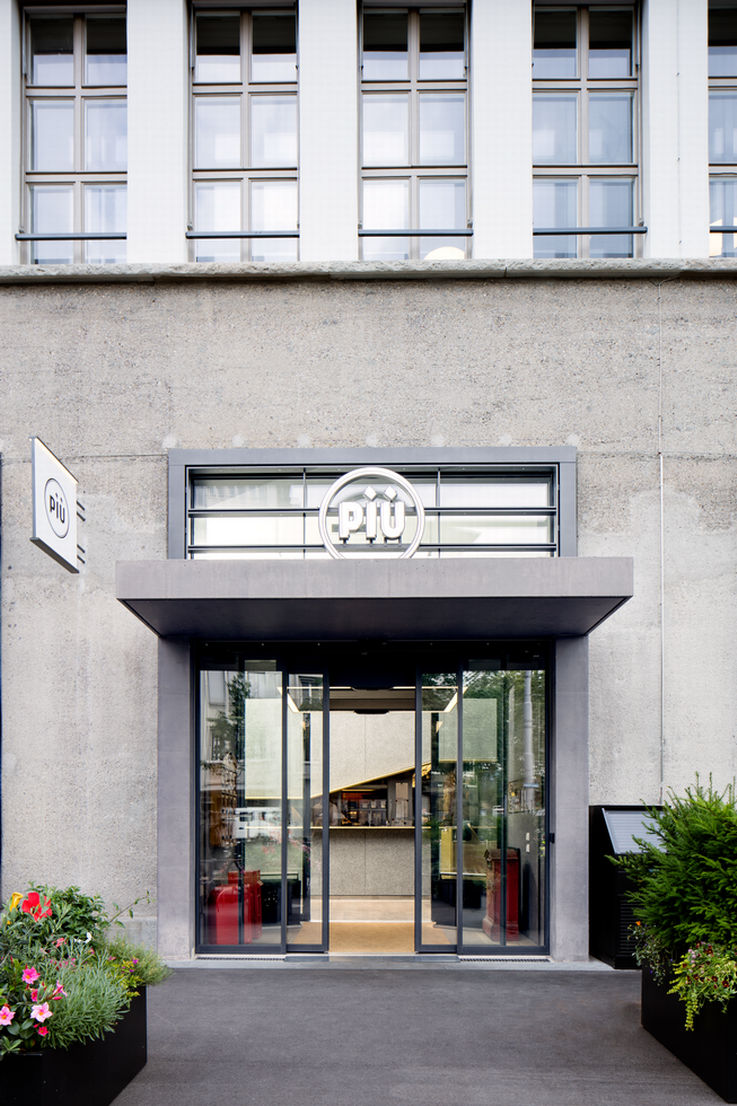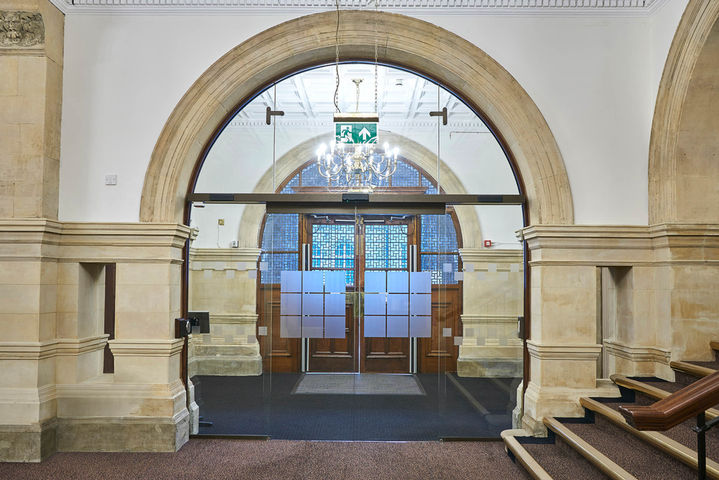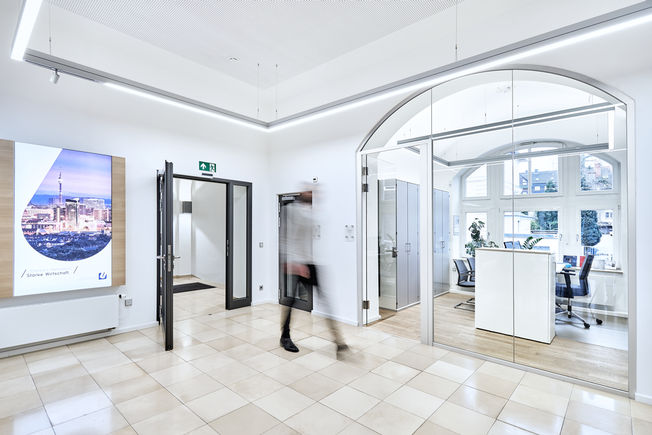Sustainable architecture in existing buildings: renovating buildings instead of demolishing them
Is your building getting a bit outdated? Perhaps it has an old heating system, leaky windows, or virtually no insulation? If that sounds familiar, you might want to consider a building renovation. You could insulate it with contemporary heating, for example, or include modern technical building systems and floor plans. You need good renovation plans and decent funding to improve the energy efficiency and design of a building.
Maintenance and modernisation of existing buildings

GEZE door technology for the entrances to the renovated Sihlpost in Zürich. © Lorenz Frey / GEZE GmbH
There are many buildings in Germany that are not equipped with state-of-the-art technology. The result: high levels of energy consumption, high heating costs, reduced quality of life – and harm to the climate and the environment. The majority of buildings in Germany were constructed prior to the first Thermal Insulation Ordinance in 1978, As a result, they are now often in need of refurbishment, at least in terms of the building's energy consumption, as defined in the Building Energy Act (GEG) on energy saving and the use of renewable energies for heating and cooling in buildings.
Building renovation refers to the structural and technical restoration, renovation, restoration or modernisation of one or more floors or an entire existing building. On the one hand, it can focus on maintenance, but also on resolving flaws (partial renovation). Often, antiquated equipment and the technical building systems are replaced and supplemented by a contemporary and modern design (full renovation).
Windows and doors play a major role in building renovations
As part of a building renovation, the outer shell of a building, walls, roof, and floors are often fitted with thermal insulation. In addition, windows and doors, the heating system, electrics and sanitary installations are most frequently renovated, replaced or exchanged in existing buildings.
Energy-efficient building refurbishment pays off
Energy-efficient building refurbishment is an important component in achieving the climate targets of the German Federal Government and the EU. More than 18 million residential buildings and around 1.7 non-residential buildings in Germany (e.g. office buildings, company buildings, hospitals, schools, universities, sports centres, theatres, and churches) should be pretty much ’climate-neutral’ by 2050, meaning they will produce virtually no CO2. In fact, energy renovation costs for non-residential buildings are amortised relatively quickly, as they often have higher energy requirements than residential buildings. Professional building renovation and modern technical building systems can sometimes reduce energy consumption by up to 80 per cent.
The state also helps with renovations of residential and non-residential buildings via KfW Bankengruppe: subsidies in the form of loans and grants are available for complete refurbishments or for individual measures such as insulation, replacement of windows, air conditioners and building automation.
KfW funding for building renovation
Via the Kreditanstalt für Wiederaufbau (KfW), the German Federal Government supports building renovations for private individuals, companies, and local authorities in the form of loans or investment grants. The basic prerequisite for funding is that the refurbishment measure leads to the KfW Efficiency House standard. The KfW Efficiency House is a technical standard that KfW uses in its promotional programmes. Different numerical values indicate how high the annual primary energy requirement of the existing property is in relation to a comparable new building. The lower the number, the higher the energy efficiency and the higher the subsidy.
- KfW energy efficiency programme - energy-efficient building and renovation (reduce energy costs in commercial buildings)
- Energy-efficient renovation (for renovation to a KfW efficient house or individual energy-related measures)
- Age-appropriate renovation (measures for reducing barriers and safeguards against burglary)
- In addition, there are also KfW subsidies for smart home systems as part of age-appropriate renovations, or as an additional measure when carrying out energy-related renovation work.
- Energy-efficient building and renovation (for energy-related renovation of existing buildings within communal and social infrastructure, no residential buildings).
- Barrier-free town (for barrier-reducing measures, via which existing communal and public buildings, traffic facilities, and public spaces can be renovated in an age-appropriate and family-friendly manner.)
Energy efficiency advice is also subsidised
KfW funding often also requires that an energy efficiency expert is involved in the creation of an energy concept. For example, homeowners and local authorities receive grants from the KfW (construction supervision grant) if an energy consultant is involved in the planning and construction supervision.
Go to the various funding opportunities offered by KfW
Building renovation for improved safety, fire protection, and accessibility
The primary aim of building renovations is of course to implement energy-saving measures – and because of the many forms of subsidies available. However, a change of use may also be a reason for a building renovation. This often leaves the owners with other issues to make decisions about. For example, if the building no longer satisfies modern safety and fire protection standards when being converted into a children’s day nursery. Or if modern usage calls for a different floor plan. For handicapped accessible living and working, Access for all can also be the goal of modernisation.
KfW funding allows owners to also redesign their building at the same time as making it more energy efficient. This means that even an old building can be converted into a Smart Building.
GEZE provides support during renovation work
GEZE can help to develop and implement new concepts for energy-saving ventilation technology and for fire protection and access for all, not only in new construction projects, but also in existing buildings. Various GEZE products can effectively help with energy saving, including indoor climate control via automated windows, door closers, and through intelligent building networks. GEZE door solutions offer barrier-free access, access convenience, escape route safety and energy efficiency.
Renovation of existing buildings
GEZE solutions aren’t just used in new buildings. With little additional effort, they can also be installed in old or existing buildings - and help save energy and money.
Questions about modernising building technology?
Retrofitting and modernising existing buildings offers many advantages and we have the solutions for window, door and security technology. Our experts will be happy to advise and support you with your challenges.
Get in touch with us on +49-7152-203-113.

GEZE is a member of the German Sustainable Building Council (DGNB)
GEZE products and solutions support sustainable building (green building). Green Building means modern, sustainable, environmentally friendly and resource-conserving construction and refurbishment of buildings in harmony with people and nature.
GEZE is an active member of the German Sustainable Building Council (DGNB). The aim of this non-profit organisation is to encourage sustainable building and operation of the built environment.
The DGNB newsletter provides regular updates from the world of sustainable building.
Specific suggestions for building automation and façade renovation
Planning is paramount when carrying out building renovations. Ideas and concrete suggestions for building automation and intelligent technical solutions for the façade should be developed as early in the process as possible:
- Implementation of a building management system (PSIM) for the centralised control and monitoring of heating, window ventilation, door systems and lighting.
- Installation of presence detectors and motion sensors to automatically adjust the air conditioning in rooms when they are not in use.
- Integration of weather stations to enable automatic adjustment of heating, night-time cooling and sun shading based on current weather conditions.
- Use of building data analysis and optimisation algorithms to analyse energy consumption in building operations and identify potential savings.
- Improving thermal insulation, for example by replacing old windows and doors with energy-efficient models with thermally separated, thermally insulated door and window profiles.
Easy installation
Many GEZE products are used in renovations as they can often be installed easily. Automatic swing door systems are, for example, characterised by a simple assembly process and they can also be retrofitted.
It’s a simple and flexible way to stay ahead of the frequently updated DIN standards and technological regulations that have to be adhered to during renovations.
Retro-fitting and updating made easy
Generally speaking, the expected lifetime and useful life of building technology has always been shorter than that of the building itself. Technical systems need to be replaced from time to time. And building technology requirements, building safety in particular, also change as a result of modifications in legislation, for example DIN 18650.
The service experts at GEZE have many years of experience and fully understand all of the demands made of building systems. This is backed by ongoing training on changing regulations and directives. We offer you new future-proof product solutions, starting with the automation of your doors, and through to the equipment or modernisation of your building with escape and rescue route solutions. And of course, we offer you the chance to update or change your drives from other manufacturers.









